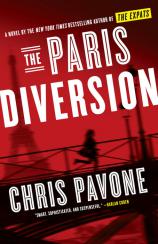Excerpt
Excerpt
The Paris Diversion

1.
Paris. 8:44 a.m.
A siren wails, far away.
Kate Moore is lingering in front of school, her daily dose of sidewalk-swimming in a sea of expat moms, gossip and chitchat and a dizzying ping-pong of cheek kisses, usually planted on both sides of the face but sometimes three pecks, or for some lunatics four separate kisses.
It’s an international school. All the parents are transplants from dozens of different countries, with different ideas about what constitutes the proper sequence. It’s an etiquette minefield, is what it is. And etiquette has never been Kate’s forte.
She cocks her head, trying to discern if the siren is approaching or receding, an instinctual habit—a professional obligation—of assessing potential levels of danger. Here in Paris, at this hour, sirens are unusual. This city is less noisy than other global capitals, London or New York, Mumbai or Hong Kong. And much less than where Kate lived before here: Luxembourg, perhaps the least noisy capital in the world; and Washington, which doesn’t even make the cut of the twenty most populous US cities.
But Kate has traveled plenty. For her job, dispatching her to far-flung destinations in Latin America and Europe. And for the past few years for adventure, driving around the Continent in their aging station wagon, with their EU driver’s licenses and bilingual kids.
Other metropoli have all seemed like more aggressive aural assaults than Paris, with more insistent car horns honked more frequently, more idling trucks and unmufflered motorcycles, jackhammers and pile drivers and bass-heavy music blaring from souped-up sound systems, fire trucks and ambulances and police cars in hot pursuit, the unmistakable urban sounds of urgency, emergency.
It’s in the mornings when Paris feels especially hushed, and in particular this slice of the septième, sleepy cafés on the quiet corners of narrow streets, well-dressed women depositing well-groomed kids at the towering green door of the school’s fortress-like façade, forbidding stone walls from which no sounds can escape, nor for that matter children.
The siren grows louder, nearer.
A curbside fence prevents the kids from running into the street, getting hit by cars. Every school’s sidewalk is lined with these fences, festooned with locked-up bicycles and kick-scooters decorated with decals of football clubs, pop singers, flower petals. The kids are absolutely safe in there.
***
After the Charlie Hebdo massacre, sirens began to take on a new significance, triggering more vital concerns. Then the November attacks ratcheted up the tension further, and then again the Champs-Elysées shooting, these events produced a permanent propensity to generalized panic.
Sirens no longer suggest a multicar pile-up on the périphérique or a gangland shoot-out in St-Denis—somebody else’s problem, somewhere else. These days, sirens could mean a nightclub shooting, hostages in a grocery store, a madman in a museum. Sirens could mean that Kate should storm into school, drag out her children, initiate one of her emergency protocols, go-bags from the linen closet, the always-gassed-up car in the garage, speeding out of the city toward the secret farmhouse in the Ardennes, or the airbase in the Ruhr, or somewhere else, anywhere else.
These days, sirens could mean anything.
It’s what everyone is talking about, the shopkeepers, restaurateurs, hoteliers. Tourism is down. Locals are wary. Customers scarce. Soldiers and police patrol the streets in threes and fours, heavily armed, flak-jacket clad. Not only near the ministries and embassies, the busy commercial boulevards and the famous monuments, but everywhere, soldiers are loitering even here, on sedate residential streets.
The military has become a permanent presence, the new normal. Sharpshooters have taken positions in the latticework of the Eiffel Tower, the flying buttresses of Notre-Dame, the neoclassical roof of the Arc de Triomphe. Everyone is getting used to it.
This is how a police state happens, isn’t it? An emergency that never subsides. Everything is getting worse all the time, so the far-right steps in and promises to solve it all—the taxes, the unemployment, the poverty and immigration and terrifying violence out in les banlieues, Balkan gunrunners and Albanian drug dealers and Corsican mobsters.
The police suit up, and never stand down.
People are talking about getting out of town, buying a crumbling pile of château in the country, starting a biodynamic vineyard or an ecofriendly bed-and-breakfast. Or to hell with it, leaving France entirely, moving to Zurich, to Helsinki or Lisbon or Edinburgh, places that are immune, or seem to be.
Kate hears a second siren, coming from another direction.
The other moms seem to be oblivious to the noise, nattering about nothing. Kate tunes them out, scans the bulletin board next to her, pushpinned with notices for kids’ activities, community meetings, nannies, holidays, the week’s lunch menu—symbols for organic, for local, for vegetarian—next to the list of every kid’s allergies, right out there on the sidewalk for anyone to see.
The goodbyes begin. With all this cheek kissing, it takes forever to say hello and goodbye. Like adding a whole new category of daily chore, now every morning you have to iron a shirt, mop the kitchen floor.
“What time would suit tonight?” asks Hashtag Mom. “And what shall we bring?” Hashtag Mom never lived anywhere except New Jersey until she was thirty-one, when she moved with her global-banker husband to London, then Singapore, then Paris. Somewhere along the way, she apparently started pretending to be British.
“Bring nothing,” Kate says, “except your good company. Everyone’s coming at seven.”
“Lovely.” Hashtag Mom leans in for her final air-kiss. For Hashtag Mom, everything, always, is hashtag lovely.
As much time as Kate needs to spend kissing all these women, she’s increasingly unwelcome to kiss her own children, not in public, especially not the mortified older one. But Kate is confident that her younger boy is just going along with that pose because that’s what younger siblings do; she knows that Ben still wants his mother’s kisses. So she sneaks them onto his head when Jake isn’t looking, an open secret right there in a crowd.
The sirens are closing in.
Now other people finally begin to react, to tilt their heads, dart their eyes, searching for whatever proximate threat might be attracting the police.
Cautionary tales, the things you hear: the aroma that turns out to be a ruptured gas main, the staph infection that over the weekend becomes an amputated leg. Lessons in vigilance, the things you could’ve done, should’ve done, if only you’d been worried enough, if you hadn’t been so lazy, so selfish, if you’d had the courage to follow your fear from the very first flush. But it’s only in hindsight that you see it clearly: this was one of those moments.
Everyone turns in unison, to where the narrow street ends at a broad boulevard, glimpses through the gap of a convoy zooming past, motorcycles followed by squad cars followed by armored trucks then more motorcycles sweeping up the rear, all those dark-blue vehicles with lights flashing, a thundering herd galloping in the direction of the river, the museums, the presidential palace, it’s all just over there, spitting distance.
Shooting distance.
It’s terror that’s amassing in Kate, a sense that something is very wrong.
Maybe it’s finally here: payback for all her mistakes. Her parenting mistakes and filial ones, her professional mistakes, matrimonial, her wrongdoings in every segment of life. She wakes up every single morning prepared for it to happen, for her life to be assailed.
Maybe it’s today.







